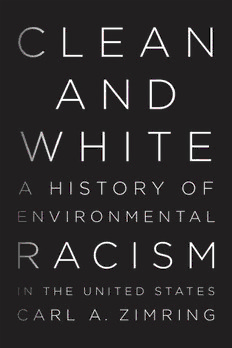
Clean and White: A History of Environmental Racism in the United States PDF
Preview Clean and White: A History of Environmental Racism in the United States
Clean and White This page intentionally left blank Clean and White A History of Environmental Racism in the United States Carl A. Zimring NEW YORK UNIVERSITY PRESS New York and London NEW YORK UNIVERSITY PRESS New York and London www.nyupress.org © 2015 by New York University All rights reserved References to Internet websites (URLs) were accurate at the time of writing. Neither the author nor New York University Press is responsible for URLs that may have expired or changed since the manuscript was prepared. ISBN: 978-1-4798-2694-0 For Library of Congress Cataloging-in-Publication data, please contact the Library of Congress. New York University Press books are printed on acid- free paper, and their binding materials are chosen for strength and durability. We strive to use environmentally responsible suppliers and materials to the greatest extent possible in publishing our books. Manufactured in the United States of America 10 9 8 7 6 5 4 3 2 1 Also available as an ebook To Jen, with love This page intentionally left blank Contents Acknowledgments ix Introduction: The Biopolitics of Waste 1 Part I. Antebellum Roots 1. Thomas Jefferson’s Ideal 9 2. The Decay of the Old 27 Part II. New Constructions 3. Searching for Order 51 4. “How Do You Make Them So Clean and White?” 79 Part III. Material Consequences 5. Dirty Work, Dirty Workers 109 6. Waste and Space Reordered 137 Part IV. Assimilation and Resistance 7. Out of Waste into Whiteness 169 8. “We Are Tired of Being at the Bottom” 192 Conclusion: A Dirty History 217 Notes 223 Bibliography 243 Index 263 About the Author 275 vii This page intentionally left blank Acknowledgments Many hands made this book possible, not least hands from several libraries and archives. I am grateful for the help of Fath Davis Ruffins and Archives Center staff at the National Museum of American History; the authors of the Integrated Public Use Microdata Series, including Steven Ruggles, J. Trent Alexander (who introduced me to the Inte- grated Public Use Microdata Series many years ago), Katie Genadek, Ronald Goeken, Matthew B. Schroeder, and Matthew Sobek; Ed Frank and the staff at the University of Memphis Library; the New York Public Library; the New- York Historical Society; the Library of Congress; and Deborah Rice and the staff at the archives of the Walter Reuther Library at Wayne State University. For financial and institutional support, thanks to the American Society for Environmental History for its Samuel P. Hays Fellowship. Thanks to Roosevelt University for a faculty development grant and sabbatical support. Thanks to Carol Lasser and the staff at Oberlin Col- lege’s Department of History and Library for research access. I have been fortunate to teach at supportive schools. Roosevelt University proved a nurturing interdisciplinary home with engaged colleagues; warm thanks to Mike Bryson, Brad Hunt, John Cicero, Amanda Putnam, Gary Wolfe, Greg Buckley, Julian Kerbis Peterhans, and all in the College of Professional Studies and to Chris Chulos, San- dra Frink, Erik Gellman, and Margie Rung in the Department of His- tory and Philosophy. Midway through writing this book, I moved to the Pratt Institute’s Department of Social Science and Cultural Studies. Pratt is an invigo- rating interdisciplinary place to call home. Thanks to my colleagues, including (but not limited to) Cisco Bradley, Ric Brown, Josiah Brownell, Lisabeth During, Ann Holder, Gregg Horowitz, May Joseph, and Uzma Rizvi. Thanks as well to my students at both Roosevelt and Pratt, as they provided thoughtful discussions of this work in our seminars. ix
